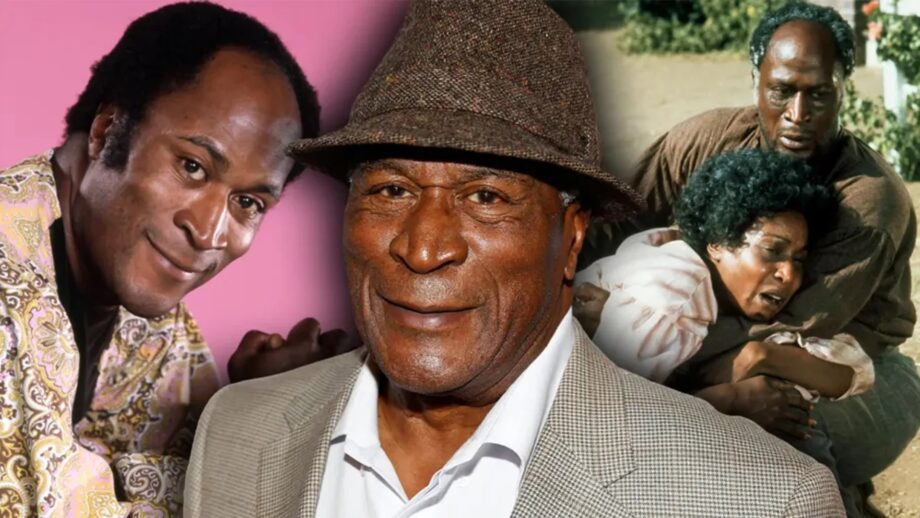The recent passing of John Amos on August 21 has left a profound void in the world of entertainment and a significant impact on Black culture. Amos, known for his powerful performances on stage and screen, carved a niche that resonated deeply with audiences. His characters not only entertained but also reflected the complexities and richness of Black life.
Born on December 27, 1939, John Allen Amos Jr. was raised in Newark, New Jersey, attended East Orange High School and went on to earn a football scholarship to Long Beach State University. Although he signed on as a free agent with the Denver Broncos after college, he was released on the second day of training camp after injuring his hamstring. He later briefly played with my hometown Kansas City Chiefs before leaving the NFL.
Amos’ acting career took flight with his role as Gordon “Gordy” Howard on the Mary Tyler Moore Show in 1970. But he gained national prominence through his role as James Evans Sr. on the groundbreaking sitcom Good Times. Airing from 1974 to 1979, the show focused on a struggling Black family in Chicago, navigating life’s challenges. Amos’s portrayal of James Evans was significant; he depicted the strong patriarch who worked tirelessly to provide for his family. This representation was crucial during a time when Black fatherhood was often misrepresented and ignored in mainstream media.
James Evans became Black America’s dad – a cultural icon, symbolizing the struggles and triumphs of Black families. Through James Evans, Amos brought to life the realities of poverty, ambition, and the aspirations for a better life, making him a relatable figure in many Black households.

In 1977, Amos was a part of the groundbreaking television miniseries Roots, to which he played the adult Kunta Kinte. Based on Alex Haley’s Pulitzer Prize winning novel, the series was a monumental hit, sweeping the Emmys and Golden Globes and watched by nearly half of the United States. Amos received a nomination for outstanding lead actor.
Amos continued with roles that challenged stereotypes and broadened the narrative scope for Black characters. He appeared in various films, including Die Hard 2, where he played Major Grant, an Army Special Forces commander. In the television series The West Wing, he portrayed Admiral Percy Fitzwallace.

We can’t forget his portrayal as Cleo McDowell in Coming to America, and reprising that role in Coming 2 America. Roots may have showed us all that Black people had African roots we should never deny, but Coming to America gave us permission to celebrate those roots. The pageantry and spectacle of Zamunda set the stage for movies like Black Panther. Both films gave us more than we could ask for and celebrated us in ways we hadn’t seen before.
Amos was also a vocal advocate for the portrayal of Black people in media. He often spoke out against the lack of nuanced representation and the tendency to pigeonhole Black actors into stereotypical roles. After three seasons, Amos he was fired from Good Times after long-standing arguments about how the show’s white writers depicted the characters. It was at the height of the show’s success but he didn’t like the way the characters were being portrayed.
We all remember that dramatic episode when Florida finally realizes comes to grips that James had passed away, smashing a salad bowl, balling up her fists and yelling out “Damn, damn, damn!” The kids run out to comfort her. It’s an unforgettable moment.

For many viewers, James Evans was not just a fictional character but a reflection of their fathers, brothers, and uncles who worked hard against systemic barriers.
John Amos’s advocacy contributed to a larger dialogue about race and representation in Hollywood which inspired following generations of actors to speak up and demand better narratives. His characters were more than just roles; they were expressions of resilience and dignity. The struggles faced by his characters resonated deeply with the Black community, offering representation at a time when such visibility was scarce.
In an industry where Black men were often portrayed in limited and negative lights, Amos’s characters broke these molds. He showcased the importance of family, education, and hard work, reinforcing values that were often overlooked in pop culture. By portraying well-rounded characters, Amos contributed significantly to the normalization of positive Black representation in media.
The legacy of John Amos extends beyond his performances; it is rooted in his unwavering commitment to authentic storytelling. His influence can be seen in the work of contemporary Black actors and creators who strive for nuanced portrayals of Black life. Shows like Black-ish and This Is Us wouldn’t have existed if it weren’t for Amos’s trailblazing efforts.
Amos’s life and career serve as a glaring reminder of the power of representation in shaping the culture and how we are perceived. He paved the way for a generation of Black actors who would follow in his footsteps, advocating for authenticity and depth in their portrayals. His contributions to television and film have left an indelible mark, and his influence will continue to resonate in the industry.




